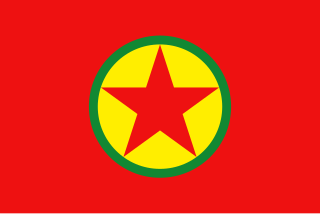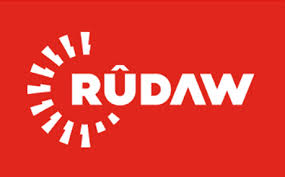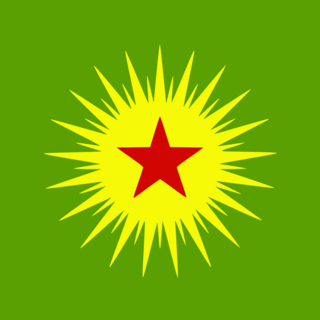Related Research Articles

Kurds or Kurdish people are an Iranian ethnic group native to the mountainous region of Kurdistan in Western Asia, which spans southeastern Turkey, northwestern Iran, northern Iraq, and northern Syria. There are exclaves of Kurds in Central Anatolia, Khorasan, and the Caucasus, as well as significant Kurdish diaspora communities in the cities of western Turkey and Western Europe. The Kurdish population is estimated to be between 30 and 45 million.

The Kurdistan Workers' Party or PKK is a Kurdish militant political organization and armed guerrilla movement, which historically operated throughout Kurdistan, but is now primarily based in the mountainous Kurdish-majority regions of southeastern Turkey and northern Iraq. Since 1984, the PKK has utilized asymmetric warfare in the Kurdish–Turkish conflict. Although the PKK once sought an independent Kurdish state, in the 1990s its aims shifted toward autonomy and increased rights for Kurds within Turkey.

The Patriotic Union of Kurdistan is a Kurdish nationalist political party in Iraqi Kurdistan. The PUK describes its goals as self-determination, human rights, democracy and peace for the Kurdish people of Kurdistan and Iraq. The PUK is currently under the co-leadership of presidents Lahur Talabany and Bafel Talabani. The PUK was founded in 1975 by Jalal Talabani, Nawshirwan Mustafa, Fuad Masum, Adel Murad, Ali Askari and Abdul Razaq Feyli.

Kurdistan or Greater Kurdistan is a roughly defined geo-cultural territory in Western Asia wherein the Kurds form a prominent majority population and the Kurdish culture, languages, and national identity have historically been based. Geographically, Kurdistan roughly encompasses the northwestern Zagros and the eastern Taurus mountain ranges.

Abdullah Öcalan, also known as Apo, is a Kurdish political prisoner and founding member of the militant Kurdistan Workers' Party (PKK).

Iraqi Kurdistan or Southern Kurdistan refers to the Kurdish-populated part of northern Iraq. It is considered one of the four parts of "Kurdistan" in Western Asia, which also includes parts of southeastern Turkey, northern Syria, and northwestern Iran. Much of the geographical and cultural region of Iraqi Kurdistan is part of the Kurdistan Region (KRI), an autonomous region recognized by the Constitution of Iraq. As with the rest of Kurdistan, and unlike most of the rest of Iraq, the region is inland and mountainous.

Nechirvan Idris Barzani is a Kurdish politician serving as the second President of Kurdistan Region, Iraq. He was elected into office by the Kurdistan Region Parliament in June 2019. Nechirvan Barzani was appointed as Vice President of the Kurdistan Democratic Party since 2010. He previously served as Prime Minister of the Kurdistan Regional Government from March 2007 to August 2009 and March 2012 to May 2019. Nechirvan Barzani is also the founder of the University Of Kurdistan - Hewler, the region's top ranking university located in Erbil. His rule combines of Kurdish nationalism, secularism, modernism and reforms, reforms in agriculture and women's rights.

Kurdistan Region is an autonomous region in Iraq comprising the four Kurdish-majority governorates of Duhok, Erbil, Halabja, and Sulaymaniyah and bordering Iran, Syria, and Turkey. The Kurdistan Region encompasses most of Iraqi Kurdistan but excludes the disputed territories of Northern Iraq, contested between the Kurdistan Regional Government and the central Iraqi government in Baghdad since 1992 when autonomy was realized. The Kurdistan Region Parliament is situated in Erbil, but the constitution of the Kurdistan Region declares the disputed city of Kirkuk to be the capital of the Kurdistan Region. When the Iraqi Army withdrew from most of the disputed areas in mid-2014 because of the ISIL offensive in Northern Iraq, Kurdish Peshmerga entered the areas and held control there until Iraq retook the areas in October 2017.
Kurds have had a long history of discrimination perpetrated against them by the Turkish government. Massacres have periodically occurred against the Kurds since the establishment of the Republic of Turkey in 1923. Among the most significant is the Dersim rebellion, when 13,160 civilians were killed by the Turkish Army and 11,818 people were sent into exile. According to McDowall, 40,000 people were killed. The Zilan massacre of 1930 was a massacre of Kurdish residents of Turkey during the Ararat rebellion, in which 5,000 to 47,000 were killed.
Kurdish nationalist uprisings have occurred periodically in Turkey, beginning with the Turkish War of Independence and the consequent transition from the Ottoman Empire into the modern Turkish state and lasting until present with the current Kurdish–Turkish conflict.

Kurds in the United States refers to people born in or residing in the United States of Kurdish origin or those considered to be ethnic Kurds.

Kurdish nationalism, is a nationalist political movement which asserts that Kurds are a nation and espouses the creation of a sovereign Kurdistan state, in opposition to the various nationalisms of the states to which Kurds are live.

Kurdistan Democratic Party/North or Türkiye Kürdistan Demokrat Partisi (TKDP), or Partiya Demokrata Kurdistana Turkiye (PDK-T), abbreviated KDP/Bakur or PDK/Bakur, is an illegal political party active in Turkey. The aim of the party is to create an independent state for the Kurdish people.

Iraqi Kurds are people born in or residing in Iraq who are of Kurdish origin. The Kurds are the largest ethnic minority in Iraq, comprising between 20% and 26.5% of the country's population according to the CIA World Factbook.

The Democratic Union Party is a Kurdish left wing political party established on 20 September 2003 in northern Syria. It is a founding member of the National Coordination Body for Democratic Change, and is described by the Carnegie Middle East Center as "one of the most important Kurdish opposition parties in Syria". It is the leading political party among Syrian Kurds. The PYD was established as a Syrian branch of the Kurdistan Workers Party (PKK) in 2003, and both organizations are still closely affiliated through the Kurdistan Communities Union (KCK).

The Autonomous Administration of North and East Syria (AANES), also known as Rojava, is a de facto autonomous region in northeastern Syria. It consists of self-governing sub-regions in the areas of Afrin, Jazira, Euphrates, Raqqa, Tabqa, Manbij and Deir Ez-Zor. The region gained its de facto autonomy in 2012 in the context of the ongoing Rojava conflict and the wider Syrian Civil War, in which its official military force, the Syrian Democratic Forces (SDF), has taken part.
Douglas Layton is the founder of several International humanitarian organizations, an American author, businessman, and champion of human rights and religious freedom in the Middle East. He is an adviser to various social and political groups including the Kurds of Iraq. Layton is also an artist and avid patron of the arts.

Rudaw Media Network, is a media group in Kurdistan Region, Iraq. It publishes in Sorani, Kurmanji, English, Arabic and Turkish. Rudaw Media Network also owns a weekly newspaper in the Sorani dialect with a circulation of 3,000, a Kurmanji version published in Europe, a website in Kurdish, English, Arabic and Turkish and a satellite TV station. The network is funded and supported by Rudaw Company and aims to impart news and information about Kurdistan and the Middle East.

Democratic confederalism also known as Kurdish communalism or Apoism is a political concept theorized by Kurdistan Workers Party (PKK) leader Abdullah Öcalan about a system of democratic self-organization with the features of a confederation based on the principles of autonomy, direct democracy, environmentalism, feminism, multiculturalism, self-defense, self-governance and elements of a sharing economy. Influenced by social ecology, libertarian municipalism, Middle Eastern history and general state theory, Öcalan presents the concept as a political solution to Kurdish nationalist aspirations, as well as other fundamental problems in countries in the region deeply rooted in class society, and as a route to freedom and democratization for people around the world.
Terrorism in Turkey is a significant issue for Turkish authorities. Most terrorist attacks in Turkey have occurred in the southeastern and eastern provinces, and major cities like Ankara and Istanbul. The group Dev-Genç was founded in 1969 and involved in a string of kidnappings, bombings and bank robberies until martial law was declared in 1971. While these incidents were halted by 1973, attacks by the Armenian groups Armenian Secret Army for the Liberation of Armenia (ASALA) and Justice Commandos of the Armenian Genocide (JCAG) continued. Most of these attacks took place internationally, though there were some attacks within Turkey as well. For example, the May 1977 bombing of the Istanbul airport and the Ankara Esenboğa Airport attack. In Turkey protesting for Kurdish rights or supporting or demanding education in the Kurdish language is often also seen as supporting terrorism of the Kurdistan Workers' Party (PKK).
References
- ↑ KurdishMedia.com "About" page Archived 2012-10-11 at the Wayback Machine ; see under "Management Team". Accessed 2012-10-01.